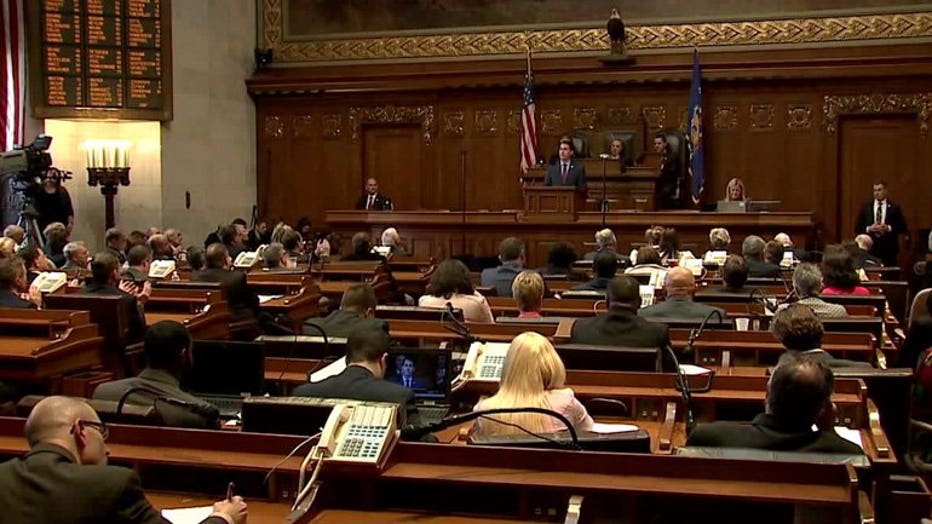Before likely re-election bid, Gov. Walker reverses cuts to UW System, K-12 schools
MADISON — Gov. Scott Walker is proposing a huge boost in funding for schools, sizable tuition cuts for college students and increased tax breaks for the working poor.
Walker released the budget Wednesday to the Republican-controlled Legislature.
The shift by the famously tightfisted Republican governor designed to position him for a third term in 2018. It also appeases his conservative base with more welfare reforms, elimination of the prevailing wage and nearly $600 million in tax cuts.
Walker says the budget makes "historic investments in our priorities."
Republican legislative leaders have been lukewarm to some of the biggest spending proposals, saying they want to see how they fit in with the larger budget.
Walker proposed a modest one-tenth of a percent decrease in the state's two lowest income tax brackets. He said it would save the average Wisconsin family $130 a year.
Road projects
Walker is following through with his promise not to raise gas taxes or vehicle registration fees to pay for roads, while abandoning Milwaukee's Interstate 94 east-west expansion project.
Major road projects in southeast Wisconsin would also face delays, to deal with a major shortfall in the state's road fund.
Walker's roads budget would rely on borrowing half a billion dollars. Assembly Republicans have said they don't want to borrow that much and instead want Walker to consider raising transportation-related revenue while cutting unspecified other taxes by an equal amount.
"Just because he's the governor doesn't mean we have to salute," said Assembly Speaker Robin Vos, R-Rochester.
Tying school money to Act 10 compliance
Public schools wanting to tap any of the $500 million in new per-student aid that Gov. Scott Walker is proposing would have to be compliant with the Act 10 law that took away collective bargaining rights.
The law also required public workers to contribute more for their pensions and health insurance costs. Most school districts have taken advantage of the law to reduce their costs by having teachers and other employees contribute more.
But some, like Madison, have been able to avoid having their teachers contribute as much for health insurance as other districts.
Walker's office didn't immediately know how many districts would not be in compliance. Other details about how the proposal would be enforced were not immediately released.
Walker's proposed increases of $200 per-pupil in 2017-18 and $204 a year later drew praise from a frequent critic, state Superintendent Tony Evers.
"This budget has more resources in it. The governor took many of my suggestions. So I think we’re in the right trajectory," Evers said.
Democrats questioned whether the governor, who has slashed K-12 funding in previous budgets, was reversing course so he increase his approval ratings ahead of a likely re-election bid in 2018.
"It did sound like a budget that was more a message for a campaign than what was real," said state Sen. Lena Taylor, D-Milwaukee. "Candidly, I don’t know where all this money’s going to come from."

Gov. Scott Walker presents his budget
Lincoln Hills
Gov. Walker isn't calling for closing the troubled Lincoln Hills juvenile prison in central Wisconsin.
Instead, Walker is proposing to hire eight new counselors to help meet staff-to-inmate ratios mandated by the federal Prison Rape Elimination Act. Even with the new staffers, the prison in Irma would still need about 50 more positions to comply with the act.
He's also calling for creating nine new nurse positions to distribute inmate medication at the prison and 3.25 positions to expand mental health services for the prison's female wing.
The prison is the subject of two federal lawsuits alleging misconduct by guards and an ongoing Federal Bureau of Investigation probe.
Self-insurance system for public workers
Gov. Scott Walker is proposing switching to a self-insurance system in 2018.
He made the proposal in the state budget he delivered to the Republican-controlled Legislature on Wednesday.
Under a self-insurance system, the state would pay for benefits directly for about 250,000 state workers and family members instead of purchasing insurance from 17 HMOs. The Group Insurance Board oversees the $1.5 billion state employee insurance program. It recommended making the change just hours before Walker put it in his budget.
Walker estimates it will save $60 million over the next two years.
Hunting, fishing fees
Hunting and fishing fees would not go up under the state budget Gov. Scott Walker is proposing.
But the state Department of Natural Resources would be allowed to raise state park admission and camping fees under the two-year spending proposal.
The budget also approved DNR Secretary Cathy Stepp's plan to reorganize the agency and not break it apart as a Republican lawmaker has proposed.
The reorganization plan calls for reducing the number of DNR divisions from seven to five, moves the Bureau of Science Services' 19 researchers into a new Office of Applied Sciences and shifts 33 ranger positions into warden positions.
Large farms also would be allowed to hire consultants to craft permit applications.

